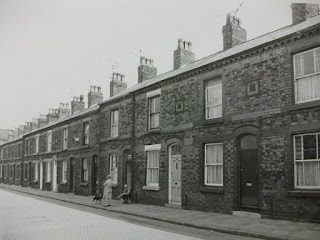Despite the incredibly suspicious circumstances surrounding the discovery of the body of a newborn baby in 1842, the mother was convicted only of concealment of birth.
On Tuesday 7th June a servant named Mary Bruce failed to show for work in Sandon Street, the message being sent by her parents that she was being asked to perform duties that she wasn't fit for. When further enquiries were made by the Mary Cole, the mistress of the house, she established that a live in servant named Elizabeth Russell had undergone 'something different to the usual course of nature.'
Two days later Agnes Harding, a nurse to Miss Cole's family, was sent for to examine Elizabeth, who admitted she had been in the family way for seven months and had put the body of a baby boy in the privy. A police constable recovered the body and a doctor who carried out a post mortem asked for two other surgeons to be present. They concluded that the pregnancy had gone its full term and that the baby had been born alive due to the lungs having absorbed air. The only abnormalities were injuries to the head, which appeared to have been caused by a sharp instrument.
Elizabeth was taken to the Bridewell where she shared a cell with a woman called Ann Smith who had been arrested for a breach of the peace. When asked by Ann why she was there, Elizabeth replied that it was in relation to a child and she had panicked when the baby didn't cry, tying a handkerchief around the neck. Her intention, she said, was to remove the baby from the privy and go to Wales.
At the inquest which was held before Mr P F Curry on 13th June the doctors, Ann and Agnes gave their evidence along with young Mary Bruce, who was only eleven years old. She said that on the day in question, she saw an infant sized bundle of rags being placed in the privy by Elizabeth, who said they had been left by some workmen. Mary went on to say she asked Elizabeth if she could have the rags, but this request was refused on the grounds they were dirty.
In summing up, Mr Curry praised the advances in anatomical science and stated that this was one of the clearest cases that had ever come before him, leading to the jury returning a verdict of wilful murder and Elizabeth being committed for trial and remanded at Kirkdale gaol.
At the assizes on 8th August Elizabeth's counsel suggested that due to Mary Bruce's young age and Ann Smith's bad character they were not reliable witnesses. They then called into question the medical evidence, saying it was possible any head injuries could have been caused when the child was laid down, Elizabeth believing it to be already dead.
The trial judge told the jury that they had to take into account the state of mind the parties were in at the time of the events. After an hours deliberation, Elizabeth was acquitted of murder but found guilty of concealment of birth. She was then sentenced to two years imprisonment.





























